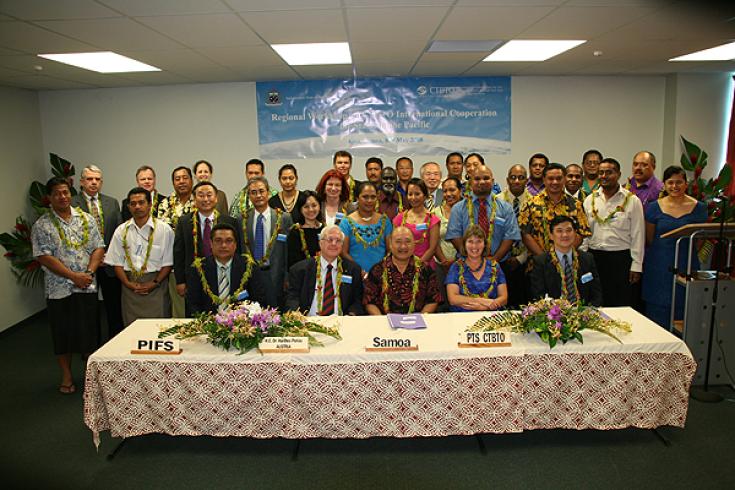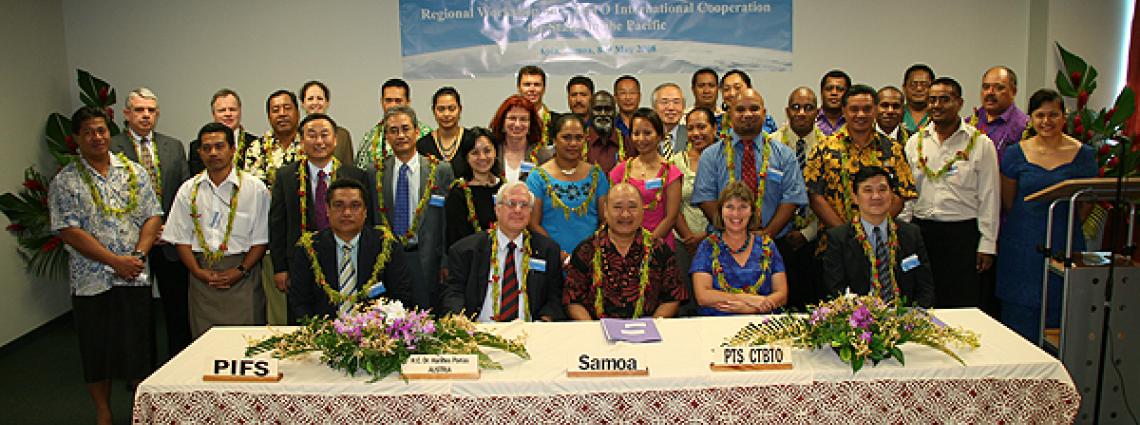Importance of CTBT ratification discussed at international cooperation workshop for States from the Pacific
The workshop was hosted by the Independent State of Samoa, with funding provided by the Austrian Government. Its objectives were to enhance awareness of the Comprehensive Nuclear-Test-Ban Treaty (CTBT), and to assist States in obtaining benefits from the work of the Preparatory Commission for the Comprehensive Nuclear-Test-Ban Treaty Organization (CTBTO) in the implementation of the CTBT. These potential benefits include the use of verification technologies for tsunami warning, the forecasting of volcanic explosions, the location of underwater explosions, and the detection of earthquakes and accidental radioactive releases. The workshop built on a series of regional and subregional international cooperation workshops which have been held between 2000 and 2007. Representatives from 13 States participated: Australia, Cook Islands, Fiji, Kiribati, Marshall Islands, Nauru, New Zealand, Palau, Papua New Guinea, Samoa, Solomon Islands, Tuvalu and Vanuatu. The workshop was also attended by representatives of several regional and intergovernmental organizations based in Samoa including the European Union, FAO, UNESCO, UNDP, WHO and WMO. Nuclear testing in Pacific Region
The history of nuclear testing in the region has shaped its commitment to a comprehensive nuclear test ban. Between the mid 1940s and the early 1960s, the United States tested over 100 nuclear weapons in the Pacific.The Marshall Islands (known as "the Pacific Proving Grounds") bore the brunt of this testing, with over 40 tests at the Enewetak Atoll and over 20 at the Bikini Atoll Testing in this area included the first underwater nuclear explosion by the United States in 1946, known as Operation Crossroads, its first hydrogen bomb in 1952 at the Enewetak Atoll, and the Castle Bravo test of 1954, which was the most powerful nuclear device ever detonated by the United States. Yielding 15 megatons, the Bravo test created the worst radiological disaster in the United States' testing history, with nuclear fallout spread out over a wide area, severely affecting several atolls in the Marshall Islands. The United Kingdom and France also conducted a number of tests in the region. Christmas Island, Kiribati, was the site of the first British hydrogen detonation in 1957. The United States and the United Kingdom tested over 30 nuclear weapons at Christmas Island. Mururoa and Fangataufa Atolls in French Polynesia were used to test the first French thermonuclear device in 1968. In total, France conducted almost 190 tests in the Pacific between 1966 and 1996. Nuclear testing by the United Kingdom and the United States in the South Pacific ceased with the 1963 Partial Test Ban Treaty, which prohibited nuclear explosions in the atmosphere, outer space and underwater. France stopped testing in the region with the 1996 Comprehensive Nuclear-Test-Ban Treaty, which also banned underground nuclear explosions.

Workshop participants: Seated from left to right of photo: Peter Forau, Deputy Secretary General of the Pacific Islands Forum Secretariat, Dr. Hannes Porias, Ambassador of Austria to Samoa, Hon. Vaelenofoafia Tapasu Leung Wai, Associate Minister for Foreign Affairs and Trade, Government of Samoa, Ms. Caroline Bilkey, High Commissioner of New Zealand to Samoa, and Ziping Gu, CTBTO Director of Legal and External Relations Division.
Ziping Gu, CTBTO Director of Legal and External Relations Division, commended the "commitment of Pacific States to nuclear non-proliferation in general and to the CTBT in particular" over the past decades. In 1985 the South Pacific was established as a nuclear-weapon-free zone under the Treaty of Rarotonga, making it only the second such zone in a populated region of the world. The Treaty of Rarotonga prohibits the testing, manufacturing, acquiring and stationing of nuclear explosive devices in any member's territory. All five nuclear-weapon States (China, France, Russia, the United Kingdom and the United States) have signed the relevant protocols to the Treaty. The CTBT is of particular relevance to the region since it constrains the development and qualitative improvement of new and more advanced nuclear weapons and strengthens the norms against the proliferation of nuclear materials, technologies and knowledge that could be used for the development of such weapons. In the words of Kofi Annan, former Secretary-General of the United Nations, the CTBT "is a crucial element in the non-proliferation regime. The longer we delay its entry into force, the greater the risk that nuclear testing will resume - and that in turn would make non-proliferation much harder to sustain". Gu also emphasized the key role that the Pacific Islands Forum has played in seeking to promote the CTBT by calling for signatures and ratification and urged those States that have not yet done so to finalize their respective ratification processes of the CTBT. Several Pacific States host CTBTO monitoring facilities
Several Forum members have been chosen to host the CTBTO's global monitoring stations, including Australia, Cook Islands, Fiji, Kiribati, New Zealand, Palau and Papua New Guinea. Forau acknowledged "the importance of these monitoring stations particularly because of the vast oceans in our region and their potential attractiveness as a location for secret testing." Seismic, hydroacoustic and infrasound stations are used to monitor the underground, the underwater and the atmosphere, respectively. Radionuclide stations can detect radioactive debris from atmospheric explosions or those vented by underground or underwater nuclear explosions. Great interest in tsunami warning
The potential benefits of CTBT verification technologies for tsunami warning were of great interest to participants, especially in view of the 2007 tsunami that struck the Solomon Islands, with tragic consequences. Together with UNESCO, the CTBTO is now providing data to organizations such as the North-West Pacific Tsunami Information Centre in Japan and the Pacific Tsunami Warning Centre in Hawaii. As the provider of the fastest seismic and hydroacoustic data, this system enhances the ability of tsunami warning centres to issue timely and reliable tsunami alerts. Remaining island States called upon to ratify CTBT
"The CTBT is multilateralism at its best," Tibor Tóth, Executive Secretary of the CTBTO, said in his closing remarks. "89 States from North, South, East and West are hosting facilities that no country could deploy alone and receive all data in near real time." He underlined the important role the Pacific Region plays in promoting the entry into force and universality of the CTBT and called for the full ratification of the Treaty in the Pacific by the six countries that have yet to do so: Marshall Islands, Niue, Papua New Guinea, Solomon Islands, Tonga and Tuvalu. Several countries in the region have already ratified the Treaty: Australia, Cook Islands, Fiji, Kiribati, Palau, Micronesia, Nauru, New Zealand, Samoa and Vanuatu. Dong-Myung Kim, Chief of the International Cooperation Section at the CTBTO that organized the workshop, expressed his appreciation for the cooperation and support provided by the organizers in Samoa and the positive feedback from participants. Ministers requested to assist in promoting ratification
Tóth also met with several government ministers while in Samoa, including the Prime Minister, Hon. Tuilaepa Lupesoliai Sailele Malielegaoi, the Minister of Natural Resources and Environment, Hon. Faumuina Liuga, the Associate Minister for Foreign Affairs and Trade, Hon. Vaelenofoafia Tapasu Leung Wai. During the meetings, tsunami warning arrangements were discussed and Tóth requested the ministers' assistance in promoting ratifications among the outstanding countries in the region.
20 May 2008
